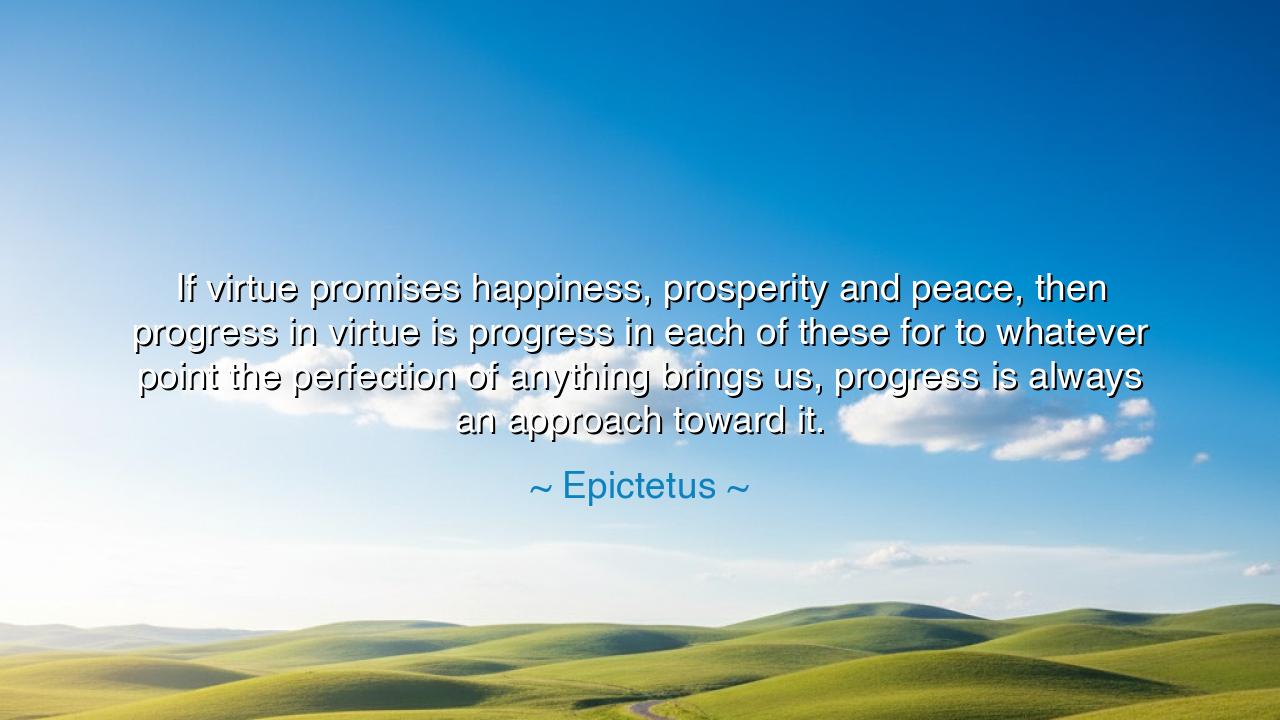
If virtue promises happiness, prosperity and peace, then progress
If virtue promises happiness, prosperity and peace, then progress in virtue is progress in each of these for to whatever point the perfection of anything brings us, progress is always an approach toward it.






“If virtue promises happiness, prosperity and peace, then progress in virtue is progress in each of these; for to whatever point the perfection of anything brings us, progress is always an approach toward it.” Thus spoke Epictetus, the Stoic sage whose words have endured like marble in the temple of wisdom. In this declaration lies the heart of the Stoic philosophy — that virtue is the root of all that is good, and that in striving toward it, a person advances toward the highest forms of happiness, prosperity, and peace. Epictetus teaches that these treasures are not won through chance or fortune, but through the steady cultivation of the soul. To live virtuously is not merely to live well — it is to live fully, in harmony with the divine order of the universe.
Born a slave and later freed, Epictetus knew suffering, poverty, and injustice firsthand. Yet he discovered within himself a power that no master could enslave — the freedom of reason and the sovereignty of virtue. He saw that happiness could not be granted or taken away by others; it lived in the choices of one’s own heart. Thus, when he says that progress in virtue is progress in happiness, he speaks from experience: every act of courage, patience, justice, or self-control is a step away from chaos and closer to inner peace. For virtue is not a gift bestowed at birth, but a road walked daily, each moment a chance to refine the soul.
To the ancients, virtue was not a moral ornament, but the essence of greatness. The Greeks called it areté, the excellence proper to a human being — to think clearly, act justly, endure bravely, and live in harmony with reason and nature. Epictetus reminds us that true happiness cannot be separated from goodness, nor prosperity from character. One who gains wealth without wisdom is impoverished in spirit; one who seeks peace without justice builds upon sand. To progress in virtue is to align one’s life with what is eternal — for the soul that grows in goodness moves toward the divine perfection from which it came.
Consider the example of Marcus Aurelius, the philosopher-emperor who ruled Rome not with tyranny, but with restraint. Amid wars, betrayal, and the burdens of empire, he turned inward to the Stoic teaching: “Waste no more time arguing what a good man should be. Be one.” In cultivating virtue, he found both happiness and peace, not in the glitter of power, but in mastery over himself. His life was proof of Epictetus’s truth — that to seek progress in virtue is to draw nearer to perfection, to bring the soul into concord with the universe. Every act of mercy or reason is a step toward the summit, and though few may reach it, every upward stride carries joy in itself.
Epictetus’s wisdom also carries a warning. In every age, men and women chase prosperity through possessions, happiness through pleasure, and peace through escape — but these things, when sought apart from virtue, fade like mist in the morning sun. The pleasures of the body end with hunger; the treasures of the world vanish with time. Only virtue endures, for it dwells not in the outer world, but in the eternal realm of the spirit. The one who progresses in virtue, even slightly, progresses in everything that matters. To live with integrity for one day is greater wealth than a lifetime of gold without conscience.
And yet, Epictetus does not demand perfection — only progress. He knew that perfection belongs to the gods, but progress belongs to us. To approach perfection is itself divine labor. Every kind word spoken, every temptation resisted, every truth embraced moves us closer to the ideal. Virtue, like the horizon, may never be fully reached, yet each step toward it transforms the traveler. To live thus is to dwell in hope, to find peace not in arrival, but in the journey itself.
Let this then be the teaching: do not measure your life by the wealth you have gathered or the praise you have won, but by how far your soul has traveled toward virtue. Seek to be wiser today than yesterday, kinder this hour than the last. When anger stirs, remember patience; when greed whispers, recall moderation; when fear clouds your mind, remember that courage is the way. For as Epictetus teaches, progress in virtue is progress in all good things — in happiness, in prosperity, and in peace.
Thus, the wisdom of the Stoic endures: virtue is both the path and the destination. To walk it is to live with purpose; to progress upon it is to draw nearer to perfection. Do not despair at your imperfections, but rejoice in your movement toward the good. Every small act of moral strength brings the soul closer to divine harmony. And when your days are done, let it be said that you did not chase fortune or fame, but that you strove always toward virtue — and in that striving, found both happiness and peace.






AAdministratorAdministrator
Welcome, honored guests. Please leave a comment, we will respond soon